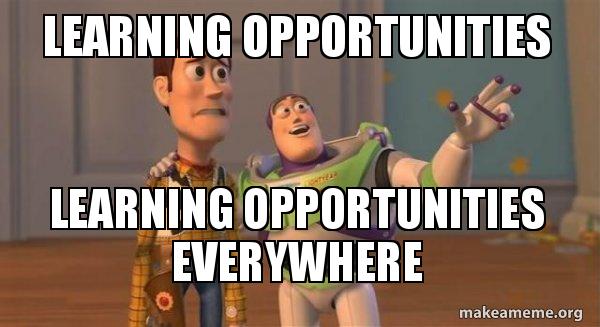The Post-PSLE Problem
As you can tell, the PSLE comes quite early. For the P6s, what do you do once the PSLE is over at the start of October?

Some schools will arrange school trips to heritage districts, and foreign-born students will zip back to their home countries to visit grandparents who haven’t seen them for quite a while. Many students will crash their computers playing games non-stop. And parents? Their relief is well-documented - there were even reports of assessment book-burning. Almost as if to recover from all that stress, parents will stick to the pre-PSLE promise to leave their kids alone.
As a teacher, I have always thought, looking at the students - after you have had your online fix, binge-watched a few drama serials, played online games for five days straight without adult intervention or supervision, what are you going to do for three months from October to December? To go from having something to do every minute of the day to having nothing to do at all - that’s odd and frankly, quite troubling.
So I have had a Post-PSLE programme every year - two cycles altogether - on Literature and Current Affairs as a starter Bridging course so that P6s appreciate that the English Language subject they slaved over - paper after paper - is no longer the same in secondary school. There’s this cool subject Literature where you read the entire story - be it play, novel or short story, and you might even get to grapple with staging a play, or engaging with a poet. You are not reading passages with blanks. You will need to know as much about what’s happening in the world as you would your singular and plural verbs, your 15-mark situational writing and your three-pic one-topic essay.
In the US Election years, in fact, I do a US Election Special because the Iowa primaries start in November. Children can learn a lot when they are not under any pressure. By the middle of November, they would have figured out how Shakespeare made a living, and maybe why your school might do Macbeth but not stage Macbeth.
I guess you can say - as a sociologist puts it - that what’s available here is cultural capital. Of course it is. I make no apologies, knowing how pragmatic parents are. I am most pleased to get impatient 12-year-olds to think about a writer’s work as opposed to only thinking about when to use the proximity rule for a contrived grammar question. I will tell them: none of the authors wrote the texts for exams.
Don’t get bored, get motivated. And most important of all, kids should not be left with the impression that one studies only for an exam. One will study, explore and examine when he has a question, a desire to learn.
So please, if your child is available, do join my 2018 Post-PSLE Pre-Sec Lit & Current Affairs Programme (six lessons):
- Saturdays 11.15am-12.45pm (Starting 6 Oct)
OR
- Tuesday 5.30pm-7pm (Starting 9 Oct)
To find out more, drop me a message at +65 81386011, or visit my website at www.english-enrichment.com.

Some schools will arrange school trips to heritage districts, and foreign-born students will zip back to their home countries to visit grandparents who haven’t seen them for quite a while. Many students will crash their computers playing games non-stop. And parents? Their relief is well-documented - there were even reports of assessment book-burning. Almost as if to recover from all that stress, parents will stick to the pre-PSLE promise to leave their kids alone.
As a teacher, I have always thought, looking at the students - after you have had your online fix, binge-watched a few drama serials, played online games for five days straight without adult intervention or supervision, what are you going to do for three months from October to December? To go from having something to do every minute of the day to having nothing to do at all - that’s odd and frankly, quite troubling.
So I have had a Post-PSLE programme every year - two cycles altogether - on Literature and Current Affairs as a starter Bridging course so that P6s appreciate that the English Language subject they slaved over - paper after paper - is no longer the same in secondary school. There’s this cool subject Literature where you read the entire story - be it play, novel or short story, and you might even get to grapple with staging a play, or engaging with a poet. You are not reading passages with blanks. You will need to know as much about what’s happening in the world as you would your singular and plural verbs, your 15-mark situational writing and your three-pic one-topic essay.
In the US Election years, in fact, I do a US Election Special because the Iowa primaries start in November. Children can learn a lot when they are not under any pressure. By the middle of November, they would have figured out how Shakespeare made a living, and maybe why your school might do Macbeth but not stage Macbeth.
I guess you can say - as a sociologist puts it - that what’s available here is cultural capital. Of course it is. I make no apologies, knowing how pragmatic parents are. I am most pleased to get impatient 12-year-olds to think about a writer’s work as opposed to only thinking about when to use the proximity rule for a contrived grammar question. I will tell them: none of the authors wrote the texts for exams.
Don’t get bored, get motivated. And most important of all, kids should not be left with the impression that one studies only for an exam. One will study, explore and examine when he has a question, a desire to learn.
So please, if your child is available, do join my 2018 Post-PSLE Pre-Sec Lit & Current Affairs Programme (six lessons):
- Saturdays 11.15am-12.45pm (Starting 6 Oct)
OR
- Tuesday 5.30pm-7pm (Starting 9 Oct)
To find out more, drop me a message at +65 81386011, or visit my website at www.english-enrichment.com.

Comments